Modern China: The Rise of the Chinese Communist Party (CCP), HUMA 1440
VerifiedAdded on 2022/09/07
|36
|12659
|24
Essay
AI Summary
This essay delves into the historical context of modern China, specifically focusing on the rise of the Chinese Communist Party (CCP). The essay explores the key factors that contributed to the CCP's transformation from a small party to a major political force by 1948. It highlights the impact of the failure of the Qing dynasty, social inequalities, and the influence of ideologies like Marxism and communism. The essay further examines the role of key figures like Mao Zedong, the impact of events such as the Opium War, the Sino-Japanese War, and the 1911 Revolution in shaping the political landscape. It analyzes the CCP's strategies, including their alliance with the Kuomintang, the Long March, and their ability to gain support from the common people. The essay concludes by emphasizing the CCP's eventual triumph, its consolidation of power, and the establishment of a new political order in China.
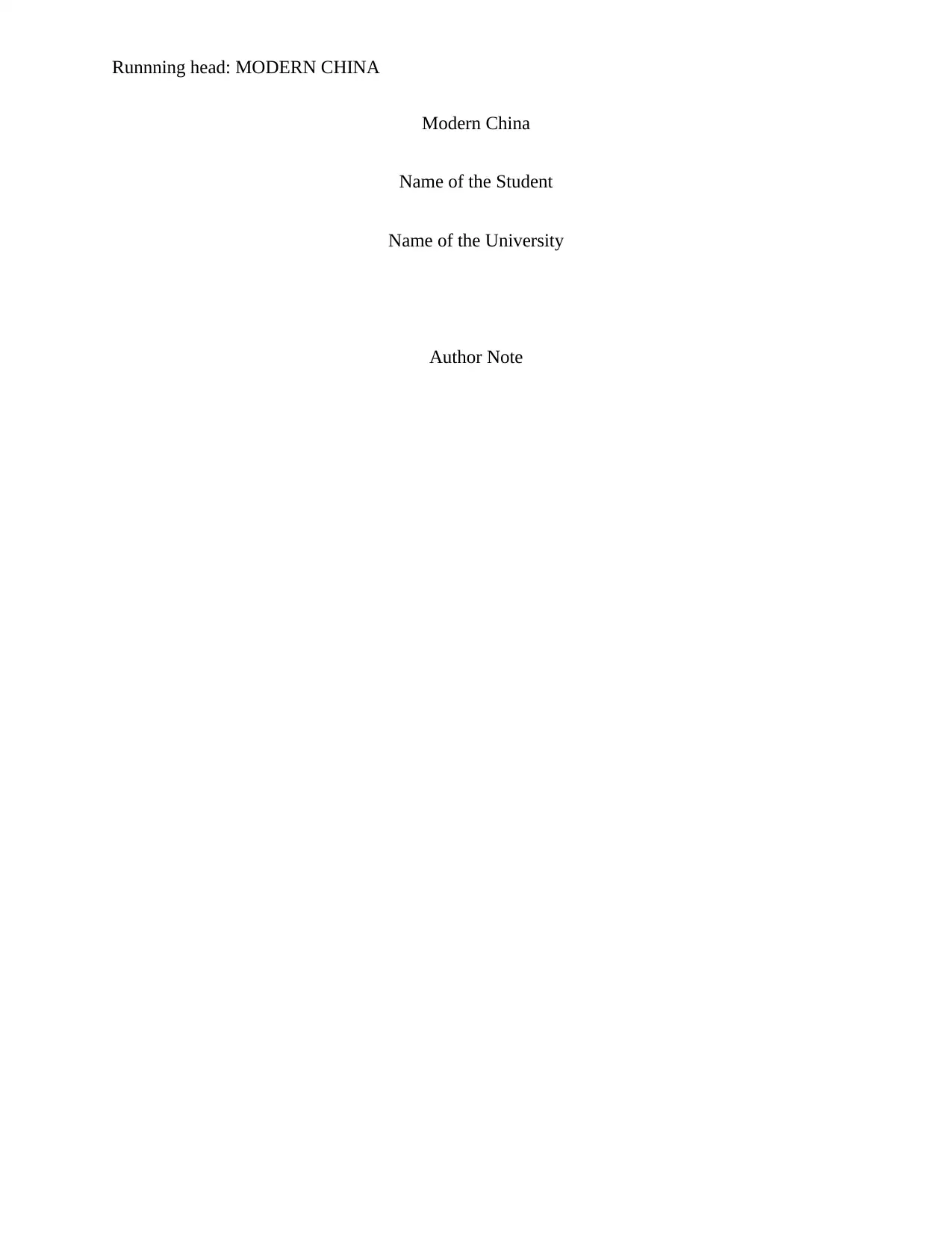
Runnning head: MODERN CHINA
Modern China
Name of the Student
Name of the University
Author Note
Modern China
Name of the Student
Name of the University
Author Note
Paraphrase This Document
Need a fresh take? Get an instant paraphrase of this document with our AI Paraphraser
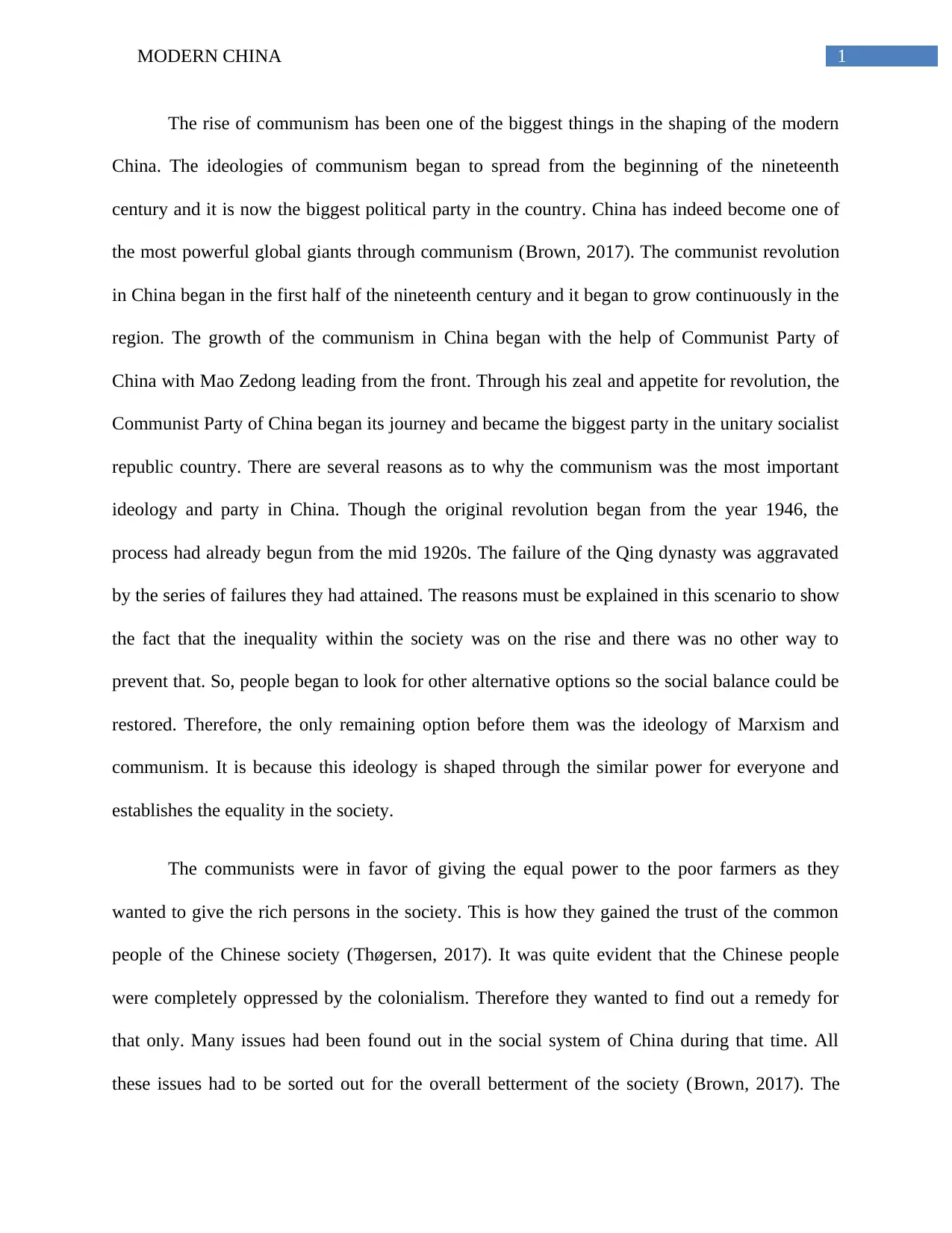
1MODERN CHINA
The rise of communism has been one of the biggest things in the shaping of the modern
China. The ideologies of communism began to spread from the beginning of the nineteenth
century and it is now the biggest political party in the country. China has indeed become one of
the most powerful global giants through communism (Brown, 2017). The communist revolution
in China began in the first half of the nineteenth century and it began to grow continuously in the
region. The growth of the communism in China began with the help of Communist Party of
China with Mao Zedong leading from the front. Through his zeal and appetite for revolution, the
Communist Party of China began its journey and became the biggest party in the unitary socialist
republic country. There are several reasons as to why the communism was the most important
ideology and party in China. Though the original revolution began from the year 1946, the
process had already begun from the mid 1920s. The failure of the Qing dynasty was aggravated
by the series of failures they had attained. The reasons must be explained in this scenario to show
the fact that the inequality within the society was on the rise and there was no other way to
prevent that. So, people began to look for other alternative options so the social balance could be
restored. Therefore, the only remaining option before them was the ideology of Marxism and
communism. It is because this ideology is shaped through the similar power for everyone and
establishes the equality in the society.
The communists were in favor of giving the equal power to the poor farmers as they
wanted to give the rich persons in the society. This is how they gained the trust of the common
people of the Chinese society (Thøgersen, 2017). It was quite evident that the Chinese people
were completely oppressed by the colonialism. Therefore they wanted to find out a remedy for
that only. Many issues had been found out in the social system of China during that time. All
these issues had to be sorted out for the overall betterment of the society (Brown, 2017). The
The rise of communism has been one of the biggest things in the shaping of the modern
China. The ideologies of communism began to spread from the beginning of the nineteenth
century and it is now the biggest political party in the country. China has indeed become one of
the most powerful global giants through communism (Brown, 2017). The communist revolution
in China began in the first half of the nineteenth century and it began to grow continuously in the
region. The growth of the communism in China began with the help of Communist Party of
China with Mao Zedong leading from the front. Through his zeal and appetite for revolution, the
Communist Party of China began its journey and became the biggest party in the unitary socialist
republic country. There are several reasons as to why the communism was the most important
ideology and party in China. Though the original revolution began from the year 1946, the
process had already begun from the mid 1920s. The failure of the Qing dynasty was aggravated
by the series of failures they had attained. The reasons must be explained in this scenario to show
the fact that the inequality within the society was on the rise and there was no other way to
prevent that. So, people began to look for other alternative options so the social balance could be
restored. Therefore, the only remaining option before them was the ideology of Marxism and
communism. It is because this ideology is shaped through the similar power for everyone and
establishes the equality in the society.
The communists were in favor of giving the equal power to the poor farmers as they
wanted to give the rich persons in the society. This is how they gained the trust of the common
people of the Chinese society (Thøgersen, 2017). It was quite evident that the Chinese people
were completely oppressed by the colonialism. Therefore they wanted to find out a remedy for
that only. Many issues had been found out in the social system of China during that time. All
these issues had to be sorted out for the overall betterment of the society (Brown, 2017). The
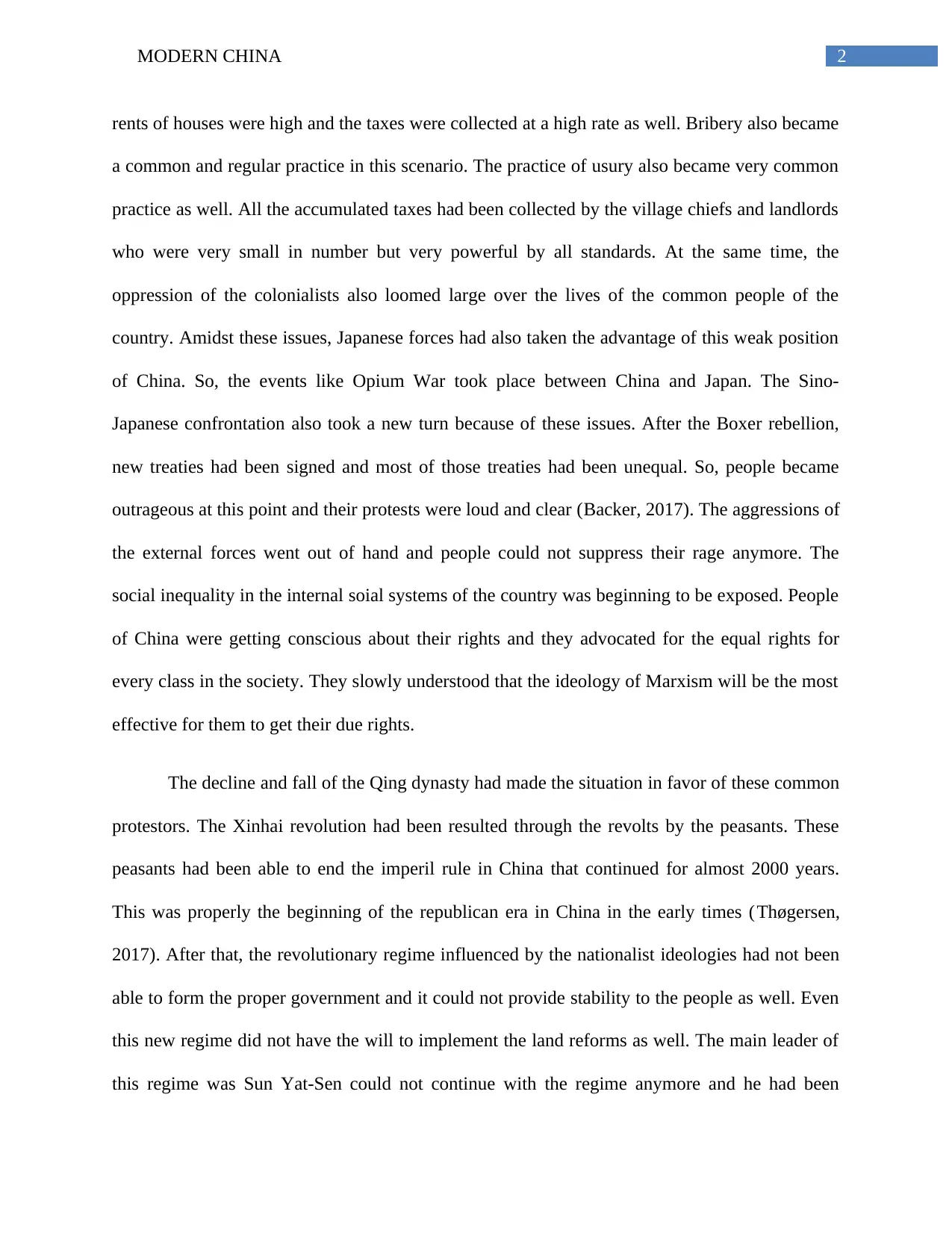
2MODERN CHINA
rents of houses were high and the taxes were collected at a high rate as well. Bribery also became
a common and regular practice in this scenario. The practice of usury also became very common
practice as well. All the accumulated taxes had been collected by the village chiefs and landlords
who were very small in number but very powerful by all standards. At the same time, the
oppression of the colonialists also loomed large over the lives of the common people of the
country. Amidst these issues, Japanese forces had also taken the advantage of this weak position
of China. So, the events like Opium War took place between China and Japan. The Sino-
Japanese confrontation also took a new turn because of these issues. After the Boxer rebellion,
new treaties had been signed and most of those treaties had been unequal. So, people became
outrageous at this point and their protests were loud and clear (Backer, 2017). The aggressions of
the external forces went out of hand and people could not suppress their rage anymore. The
social inequality in the internal soial systems of the country was beginning to be exposed. People
of China were getting conscious about their rights and they advocated for the equal rights for
every class in the society. They slowly understood that the ideology of Marxism will be the most
effective for them to get their due rights.
The decline and fall of the Qing dynasty had made the situation in favor of these common
protestors. The Xinhai revolution had been resulted through the revolts by the peasants. These
peasants had been able to end the imperil rule in China that continued for almost 2000 years.
This was properly the beginning of the republican era in China in the early times (Thøgersen,
2017). After that, the revolutionary regime influenced by the nationalist ideologies had not been
able to form the proper government and it could not provide stability to the people as well. Even
this new regime did not have the will to implement the land reforms as well. The main leader of
this regime was Sun Yat-Sen could not continue with the regime anymore and he had been
rents of houses were high and the taxes were collected at a high rate as well. Bribery also became
a common and regular practice in this scenario. The practice of usury also became very common
practice as well. All the accumulated taxes had been collected by the village chiefs and landlords
who were very small in number but very powerful by all standards. At the same time, the
oppression of the colonialists also loomed large over the lives of the common people of the
country. Amidst these issues, Japanese forces had also taken the advantage of this weak position
of China. So, the events like Opium War took place between China and Japan. The Sino-
Japanese confrontation also took a new turn because of these issues. After the Boxer rebellion,
new treaties had been signed and most of those treaties had been unequal. So, people became
outrageous at this point and their protests were loud and clear (Backer, 2017). The aggressions of
the external forces went out of hand and people could not suppress their rage anymore. The
social inequality in the internal soial systems of the country was beginning to be exposed. People
of China were getting conscious about their rights and they advocated for the equal rights for
every class in the society. They slowly understood that the ideology of Marxism will be the most
effective for them to get their due rights.
The decline and fall of the Qing dynasty had made the situation in favor of these common
protestors. The Xinhai revolution had been resulted through the revolts by the peasants. These
peasants had been able to end the imperil rule in China that continued for almost 2000 years.
This was properly the beginning of the republican era in China in the early times (Thøgersen,
2017). After that, the revolutionary regime influenced by the nationalist ideologies had not been
able to form the proper government and it could not provide stability to the people as well. Even
this new regime did not have the will to implement the land reforms as well. The main leader of
this regime was Sun Yat-Sen could not continue with the regime anymore and he had been
⊘ This is a preview!⊘
Do you want full access?
Subscribe today to unlock all pages.

Trusted by 1+ million students worldwide
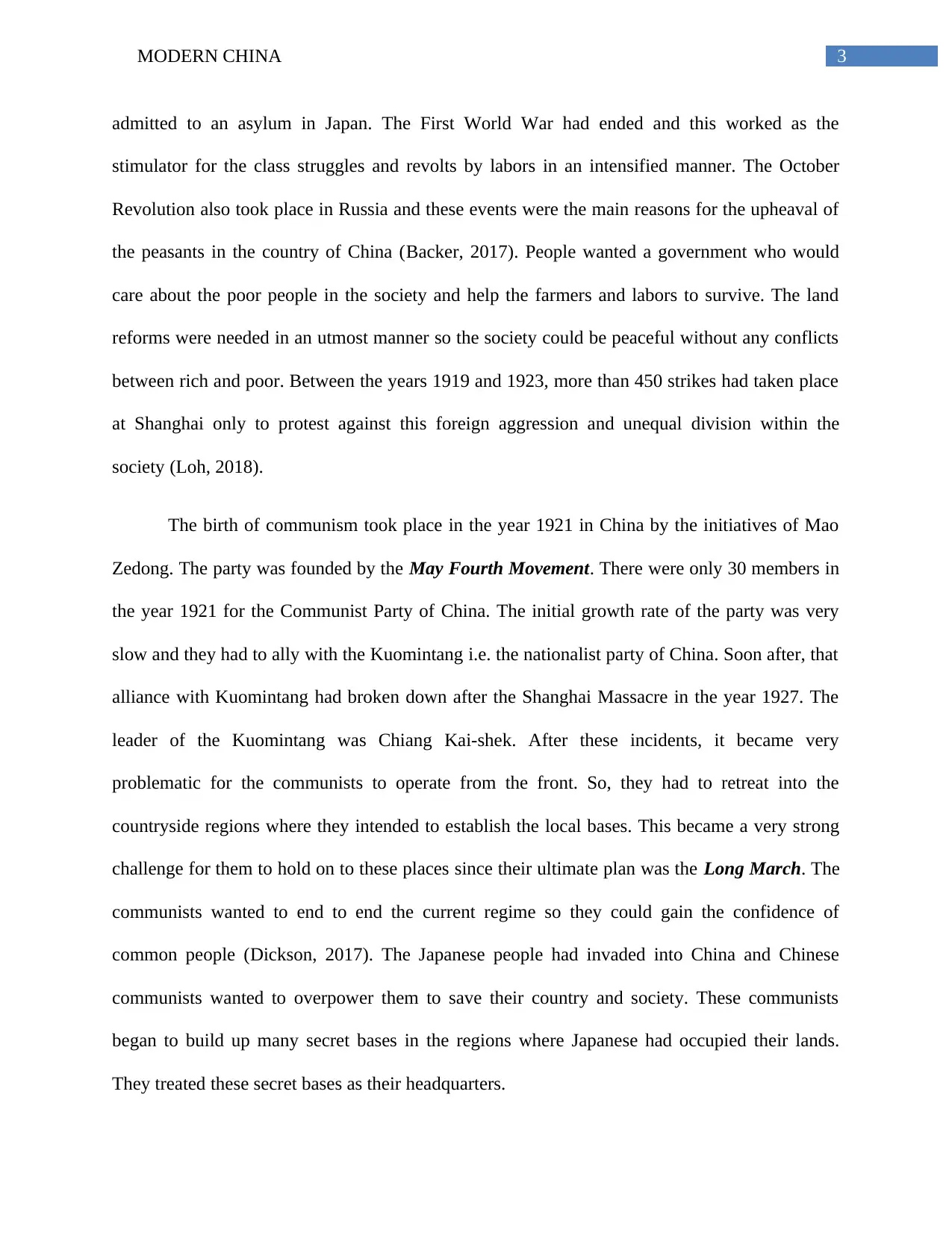
3MODERN CHINA
admitted to an asylum in Japan. The First World War had ended and this worked as the
stimulator for the class struggles and revolts by labors in an intensified manner. The October
Revolution also took place in Russia and these events were the main reasons for the upheaval of
the peasants in the country of China (Backer, 2017). People wanted a government who would
care about the poor people in the society and help the farmers and labors to survive. The land
reforms were needed in an utmost manner so the society could be peaceful without any conflicts
between rich and poor. Between the years 1919 and 1923, more than 450 strikes had taken place
at Shanghai only to protest against this foreign aggression and unequal division within the
society (Loh, 2018).
The birth of communism took place in the year 1921 in China by the initiatives of Mao
Zedong. The party was founded by the May Fourth Movement. There were only 30 members in
the year 1921 for the Communist Party of China. The initial growth rate of the party was very
slow and they had to ally with the Kuomintang i.e. the nationalist party of China. Soon after, that
alliance with Kuomintang had broken down after the Shanghai Massacre in the year 1927. The
leader of the Kuomintang was Chiang Kai-shek. After these incidents, it became very
problematic for the communists to operate from the front. So, they had to retreat into the
countryside regions where they intended to establish the local bases. This became a very strong
challenge for them to hold on to these places since their ultimate plan was the Long March. The
communists wanted to end to end the current regime so they could gain the confidence of
common people (Dickson, 2017). The Japanese people had invaded into China and Chinese
communists wanted to overpower them to save their country and society. These communists
began to build up many secret bases in the regions where Japanese had occupied their lands.
They treated these secret bases as their headquarters.
admitted to an asylum in Japan. The First World War had ended and this worked as the
stimulator for the class struggles and revolts by labors in an intensified manner. The October
Revolution also took place in Russia and these events were the main reasons for the upheaval of
the peasants in the country of China (Backer, 2017). People wanted a government who would
care about the poor people in the society and help the farmers and labors to survive. The land
reforms were needed in an utmost manner so the society could be peaceful without any conflicts
between rich and poor. Between the years 1919 and 1923, more than 450 strikes had taken place
at Shanghai only to protest against this foreign aggression and unequal division within the
society (Loh, 2018).
The birth of communism took place in the year 1921 in China by the initiatives of Mao
Zedong. The party was founded by the May Fourth Movement. There were only 30 members in
the year 1921 for the Communist Party of China. The initial growth rate of the party was very
slow and they had to ally with the Kuomintang i.e. the nationalist party of China. Soon after, that
alliance with Kuomintang had broken down after the Shanghai Massacre in the year 1927. The
leader of the Kuomintang was Chiang Kai-shek. After these incidents, it became very
problematic for the communists to operate from the front. So, they had to retreat into the
countryside regions where they intended to establish the local bases. This became a very strong
challenge for them to hold on to these places since their ultimate plan was the Long March. The
communists wanted to end to end the current regime so they could gain the confidence of
common people (Dickson, 2017). The Japanese people had invaded into China and Chinese
communists wanted to overpower them to save their country and society. These communists
began to build up many secret bases in the regions where Japanese had occupied their lands.
They treated these secret bases as their headquarters.
Paraphrase This Document
Need a fresh take? Get an instant paraphrase of this document with our AI Paraphraser
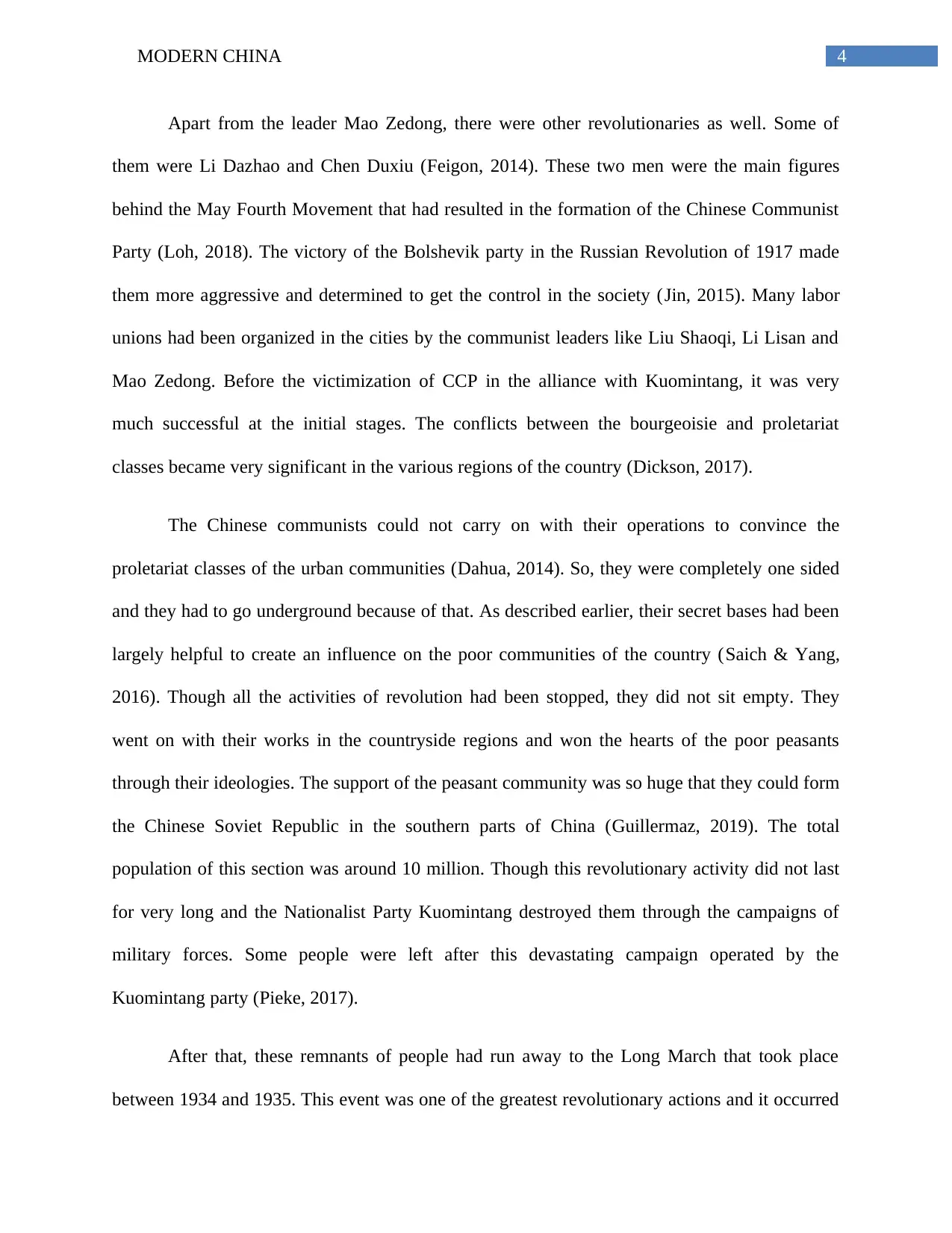
4MODERN CHINA
Apart from the leader Mao Zedong, there were other revolutionaries as well. Some of
them were Li Dazhao and Chen Duxiu (Feigon, 2014). These two men were the main figures
behind the May Fourth Movement that had resulted in the formation of the Chinese Communist
Party (Loh, 2018). The victory of the Bolshevik party in the Russian Revolution of 1917 made
them more aggressive and determined to get the control in the society (Jin, 2015). Many labor
unions had been organized in the cities by the communist leaders like Liu Shaoqi, Li Lisan and
Mao Zedong. Before the victimization of CCP in the alliance with Kuomintang, it was very
much successful at the initial stages. The conflicts between the bourgeoisie and proletariat
classes became very significant in the various regions of the country (Dickson, 2017).
The Chinese communists could not carry on with their operations to convince the
proletariat classes of the urban communities (Dahua, 2014). So, they were completely one sided
and they had to go underground because of that. As described earlier, their secret bases had been
largely helpful to create an influence on the poor communities of the country (Saich & Yang,
2016). Though all the activities of revolution had been stopped, they did not sit empty. They
went on with their works in the countryside regions and won the hearts of the poor peasants
through their ideologies. The support of the peasant community was so huge that they could form
the Chinese Soviet Republic in the southern parts of China (Guillermaz, 2019). The total
population of this section was around 10 million. Though this revolutionary activity did not last
for very long and the Nationalist Party Kuomintang destroyed them through the campaigns of
military forces. Some people were left after this devastating campaign operated by the
Kuomintang party (Pieke, 2017).
After that, these remnants of people had run away to the Long March that took place
between 1934 and 1935. This event was one of the greatest revolutionary actions and it occurred
Apart from the leader Mao Zedong, there were other revolutionaries as well. Some of
them were Li Dazhao and Chen Duxiu (Feigon, 2014). These two men were the main figures
behind the May Fourth Movement that had resulted in the formation of the Chinese Communist
Party (Loh, 2018). The victory of the Bolshevik party in the Russian Revolution of 1917 made
them more aggressive and determined to get the control in the society (Jin, 2015). Many labor
unions had been organized in the cities by the communist leaders like Liu Shaoqi, Li Lisan and
Mao Zedong. Before the victimization of CCP in the alliance with Kuomintang, it was very
much successful at the initial stages. The conflicts between the bourgeoisie and proletariat
classes became very significant in the various regions of the country (Dickson, 2017).
The Chinese communists could not carry on with their operations to convince the
proletariat classes of the urban communities (Dahua, 2014). So, they were completely one sided
and they had to go underground because of that. As described earlier, their secret bases had been
largely helpful to create an influence on the poor communities of the country (Saich & Yang,
2016). Though all the activities of revolution had been stopped, they did not sit empty. They
went on with their works in the countryside regions and won the hearts of the poor peasants
through their ideologies. The support of the peasant community was so huge that they could form
the Chinese Soviet Republic in the southern parts of China (Guillermaz, 2019). The total
population of this section was around 10 million. Though this revolutionary activity did not last
for very long and the Nationalist Party Kuomintang destroyed them through the campaigns of
military forces. Some people were left after this devastating campaign operated by the
Kuomintang party (Pieke, 2017).
After that, these remnants of people had run away to the Long March that took place
between 1934 and 1935. This event was one of the greatest revolutionary actions and it occurred
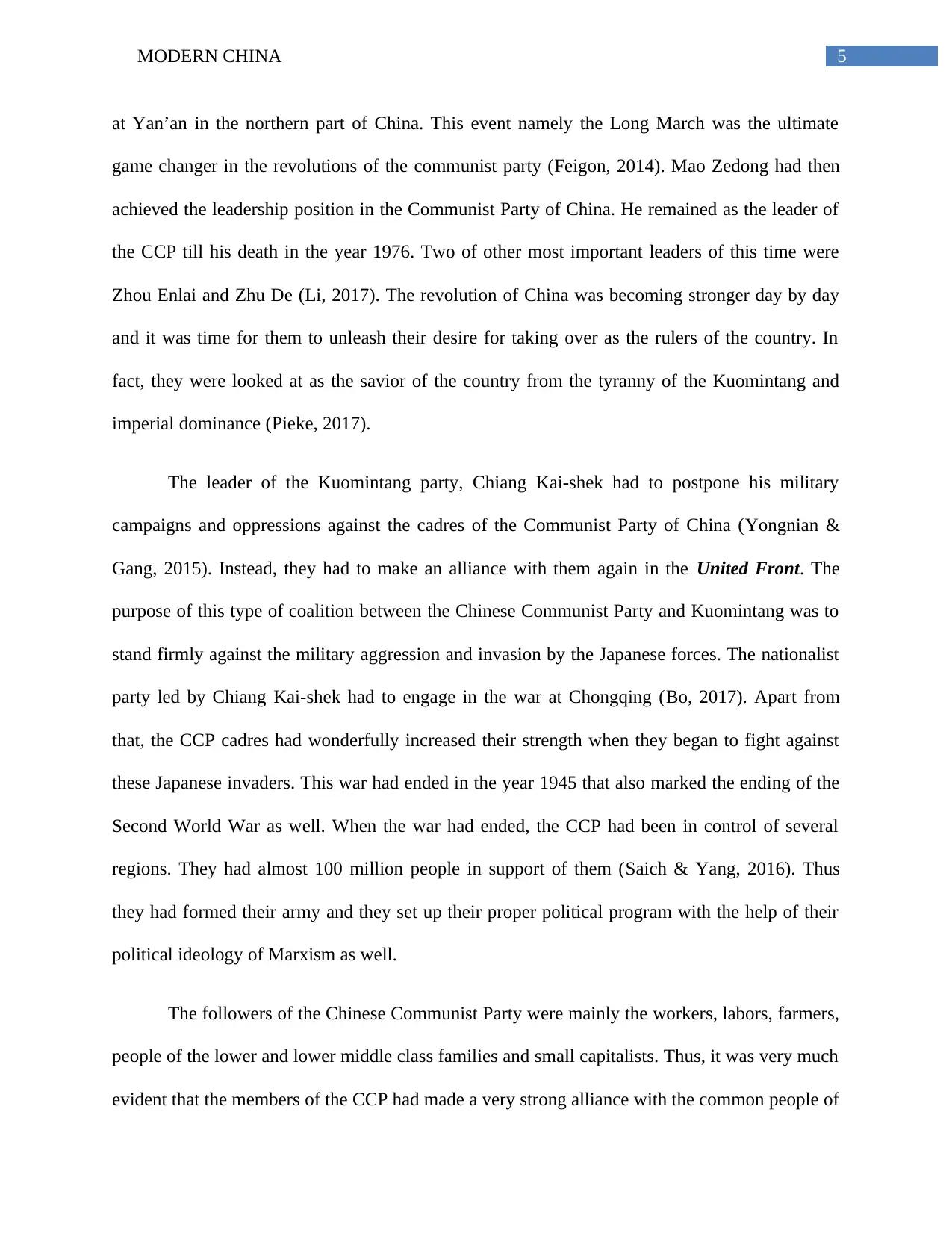
5MODERN CHINA
at Yan’an in the northern part of China. This event namely the Long March was the ultimate
game changer in the revolutions of the communist party (Feigon, 2014). Mao Zedong had then
achieved the leadership position in the Communist Party of China. He remained as the leader of
the CCP till his death in the year 1976. Two of other most important leaders of this time were
Zhou Enlai and Zhu De (Li, 2017). The revolution of China was becoming stronger day by day
and it was time for them to unleash their desire for taking over as the rulers of the country. In
fact, they were looked at as the savior of the country from the tyranny of the Kuomintang and
imperial dominance (Pieke, 2017).
The leader of the Kuomintang party, Chiang Kai-shek had to postpone his military
campaigns and oppressions against the cadres of the Communist Party of China (Yongnian &
Gang, 2015). Instead, they had to make an alliance with them again in the United Front. The
purpose of this type of coalition between the Chinese Communist Party and Kuomintang was to
stand firmly against the military aggression and invasion by the Japanese forces. The nationalist
party led by Chiang Kai-shek had to engage in the war at Chongqing (Bo, 2017). Apart from
that, the CCP cadres had wonderfully increased their strength when they began to fight against
these Japanese invaders. This war had ended in the year 1945 that also marked the ending of the
Second World War as well. When the war had ended, the CCP had been in control of several
regions. They had almost 100 million people in support of them (Saich & Yang, 2016). Thus
they had formed their army and they set up their proper political program with the help of their
political ideology of Marxism as well.
The followers of the Chinese Communist Party were mainly the workers, labors, farmers,
people of the lower and lower middle class families and small capitalists. Thus, it was very much
evident that the members of the CCP had made a very strong alliance with the common people of
at Yan’an in the northern part of China. This event namely the Long March was the ultimate
game changer in the revolutions of the communist party (Feigon, 2014). Mao Zedong had then
achieved the leadership position in the Communist Party of China. He remained as the leader of
the CCP till his death in the year 1976. Two of other most important leaders of this time were
Zhou Enlai and Zhu De (Li, 2017). The revolution of China was becoming stronger day by day
and it was time for them to unleash their desire for taking over as the rulers of the country. In
fact, they were looked at as the savior of the country from the tyranny of the Kuomintang and
imperial dominance (Pieke, 2017).
The leader of the Kuomintang party, Chiang Kai-shek had to postpone his military
campaigns and oppressions against the cadres of the Communist Party of China (Yongnian &
Gang, 2015). Instead, they had to make an alliance with them again in the United Front. The
purpose of this type of coalition between the Chinese Communist Party and Kuomintang was to
stand firmly against the military aggression and invasion by the Japanese forces. The nationalist
party led by Chiang Kai-shek had to engage in the war at Chongqing (Bo, 2017). Apart from
that, the CCP cadres had wonderfully increased their strength when they began to fight against
these Japanese invaders. This war had ended in the year 1945 that also marked the ending of the
Second World War as well. When the war had ended, the CCP had been in control of several
regions. They had almost 100 million people in support of them (Saich & Yang, 2016). Thus
they had formed their army and they set up their proper political program with the help of their
political ideology of Marxism as well.
The followers of the Chinese Communist Party were mainly the workers, labors, farmers,
people of the lower and lower middle class families and small capitalists. Thus, it was very much
evident that the members of the CCP had made a very strong alliance with the common people of
⊘ This is a preview!⊘
Do you want full access?
Subscribe today to unlock all pages.

Trusted by 1+ million students worldwide
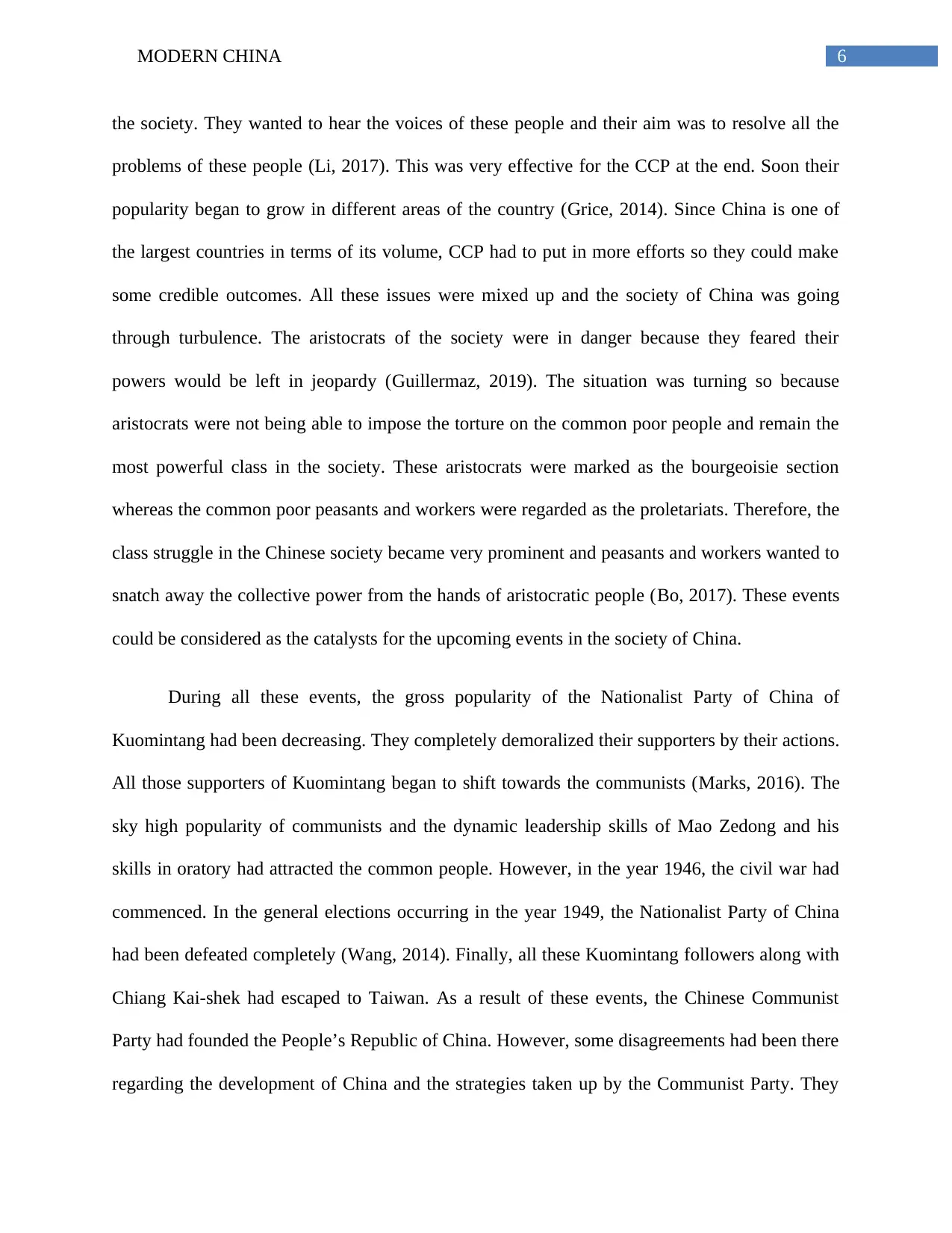
6MODERN CHINA
the society. They wanted to hear the voices of these people and their aim was to resolve all the
problems of these people (Li, 2017). This was very effective for the CCP at the end. Soon their
popularity began to grow in different areas of the country (Grice, 2014). Since China is one of
the largest countries in terms of its volume, CCP had to put in more efforts so they could make
some credible outcomes. All these issues were mixed up and the society of China was going
through turbulence. The aristocrats of the society were in danger because they feared their
powers would be left in jeopardy (Guillermaz, 2019). The situation was turning so because
aristocrats were not being able to impose the torture on the common poor people and remain the
most powerful class in the society. These aristocrats were marked as the bourgeoisie section
whereas the common poor peasants and workers were regarded as the proletariats. Therefore, the
class struggle in the Chinese society became very prominent and peasants and workers wanted to
snatch away the collective power from the hands of aristocratic people (Bo, 2017). These events
could be considered as the catalysts for the upcoming events in the society of China.
During all these events, the gross popularity of the Nationalist Party of China of
Kuomintang had been decreasing. They completely demoralized their supporters by their actions.
All those supporters of Kuomintang began to shift towards the communists (Marks, 2016). The
sky high popularity of communists and the dynamic leadership skills of Mao Zedong and his
skills in oratory had attracted the common people. However, in the year 1946, the civil war had
commenced. In the general elections occurring in the year 1949, the Nationalist Party of China
had been defeated completely (Wang, 2014). Finally, all these Kuomintang followers along with
Chiang Kai-shek had escaped to Taiwan. As a result of these events, the Chinese Communist
Party had founded the People’s Republic of China. However, some disagreements had been there
regarding the development of China and the strategies taken up by the Communist Party. They
the society. They wanted to hear the voices of these people and their aim was to resolve all the
problems of these people (Li, 2017). This was very effective for the CCP at the end. Soon their
popularity began to grow in different areas of the country (Grice, 2014). Since China is one of
the largest countries in terms of its volume, CCP had to put in more efforts so they could make
some credible outcomes. All these issues were mixed up and the society of China was going
through turbulence. The aristocrats of the society were in danger because they feared their
powers would be left in jeopardy (Guillermaz, 2019). The situation was turning so because
aristocrats were not being able to impose the torture on the common poor people and remain the
most powerful class in the society. These aristocrats were marked as the bourgeoisie section
whereas the common poor peasants and workers were regarded as the proletariats. Therefore, the
class struggle in the Chinese society became very prominent and peasants and workers wanted to
snatch away the collective power from the hands of aristocratic people (Bo, 2017). These events
could be considered as the catalysts for the upcoming events in the society of China.
During all these events, the gross popularity of the Nationalist Party of China of
Kuomintang had been decreasing. They completely demoralized their supporters by their actions.
All those supporters of Kuomintang began to shift towards the communists (Marks, 2016). The
sky high popularity of communists and the dynamic leadership skills of Mao Zedong and his
skills in oratory had attracted the common people. However, in the year 1946, the civil war had
commenced. In the general elections occurring in the year 1949, the Nationalist Party of China
had been defeated completely (Wang, 2014). Finally, all these Kuomintang followers along with
Chiang Kai-shek had escaped to Taiwan. As a result of these events, the Chinese Communist
Party had founded the People’s Republic of China. However, some disagreements had been there
regarding the development of China and the strategies taken up by the Communist Party. They
Paraphrase This Document
Need a fresh take? Get an instant paraphrase of this document with our AI Paraphraser
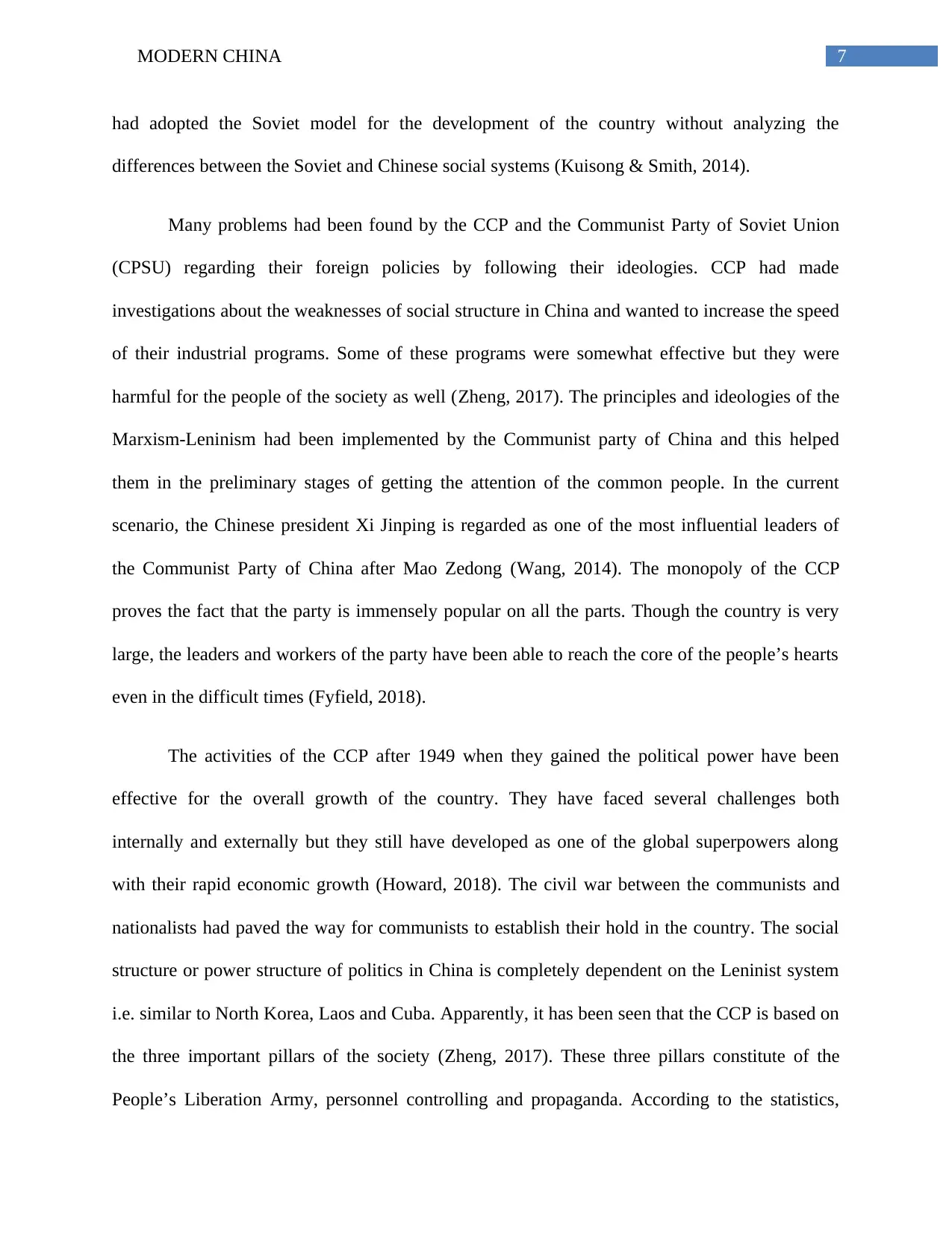
7MODERN CHINA
had adopted the Soviet model for the development of the country without analyzing the
differences between the Soviet and Chinese social systems (Kuisong & Smith, 2014).
Many problems had been found by the CCP and the Communist Party of Soviet Union
(CPSU) regarding their foreign policies by following their ideologies. CCP had made
investigations about the weaknesses of social structure in China and wanted to increase the speed
of their industrial programs. Some of these programs were somewhat effective but they were
harmful for the people of the society as well (Zheng, 2017). The principles and ideologies of the
Marxism-Leninism had been implemented by the Communist party of China and this helped
them in the preliminary stages of getting the attention of the common people. In the current
scenario, the Chinese president Xi Jinping is regarded as one of the most influential leaders of
the Communist Party of China after Mao Zedong (Wang, 2014). The monopoly of the CCP
proves the fact that the party is immensely popular on all the parts. Though the country is very
large, the leaders and workers of the party have been able to reach the core of the people’s hearts
even in the difficult times (Fyfield, 2018).
The activities of the CCP after 1949 when they gained the political power have been
effective for the overall growth of the country. They have faced several challenges both
internally and externally but they still have developed as one of the global superpowers along
with their rapid economic growth (Howard, 2018). The civil war between the communists and
nationalists had paved the way for communists to establish their hold in the country. The social
structure or power structure of politics in China is completely dependent on the Leninist system
i.e. similar to North Korea, Laos and Cuba. Apparently, it has been seen that the CCP is based on
the three important pillars of the society (Zheng, 2017). These three pillars constitute of the
People’s Liberation Army, personnel controlling and propaganda. According to the statistics,
had adopted the Soviet model for the development of the country without analyzing the
differences between the Soviet and Chinese social systems (Kuisong & Smith, 2014).
Many problems had been found by the CCP and the Communist Party of Soviet Union
(CPSU) regarding their foreign policies by following their ideologies. CCP had made
investigations about the weaknesses of social structure in China and wanted to increase the speed
of their industrial programs. Some of these programs were somewhat effective but they were
harmful for the people of the society as well (Zheng, 2017). The principles and ideologies of the
Marxism-Leninism had been implemented by the Communist party of China and this helped
them in the preliminary stages of getting the attention of the common people. In the current
scenario, the Chinese president Xi Jinping is regarded as one of the most influential leaders of
the Communist Party of China after Mao Zedong (Wang, 2014). The monopoly of the CCP
proves the fact that the party is immensely popular on all the parts. Though the country is very
large, the leaders and workers of the party have been able to reach the core of the people’s hearts
even in the difficult times (Fyfield, 2018).
The activities of the CCP after 1949 when they gained the political power have been
effective for the overall growth of the country. They have faced several challenges both
internally and externally but they still have developed as one of the global superpowers along
with their rapid economic growth (Howard, 2018). The civil war between the communists and
nationalists had paved the way for communists to establish their hold in the country. The social
structure or power structure of politics in China is completely dependent on the Leninist system
i.e. similar to North Korea, Laos and Cuba. Apparently, it has been seen that the CCP is based on
the three important pillars of the society (Zheng, 2017). These three pillars constitute of the
People’s Liberation Army, personnel controlling and propaganda. According to the statistics,
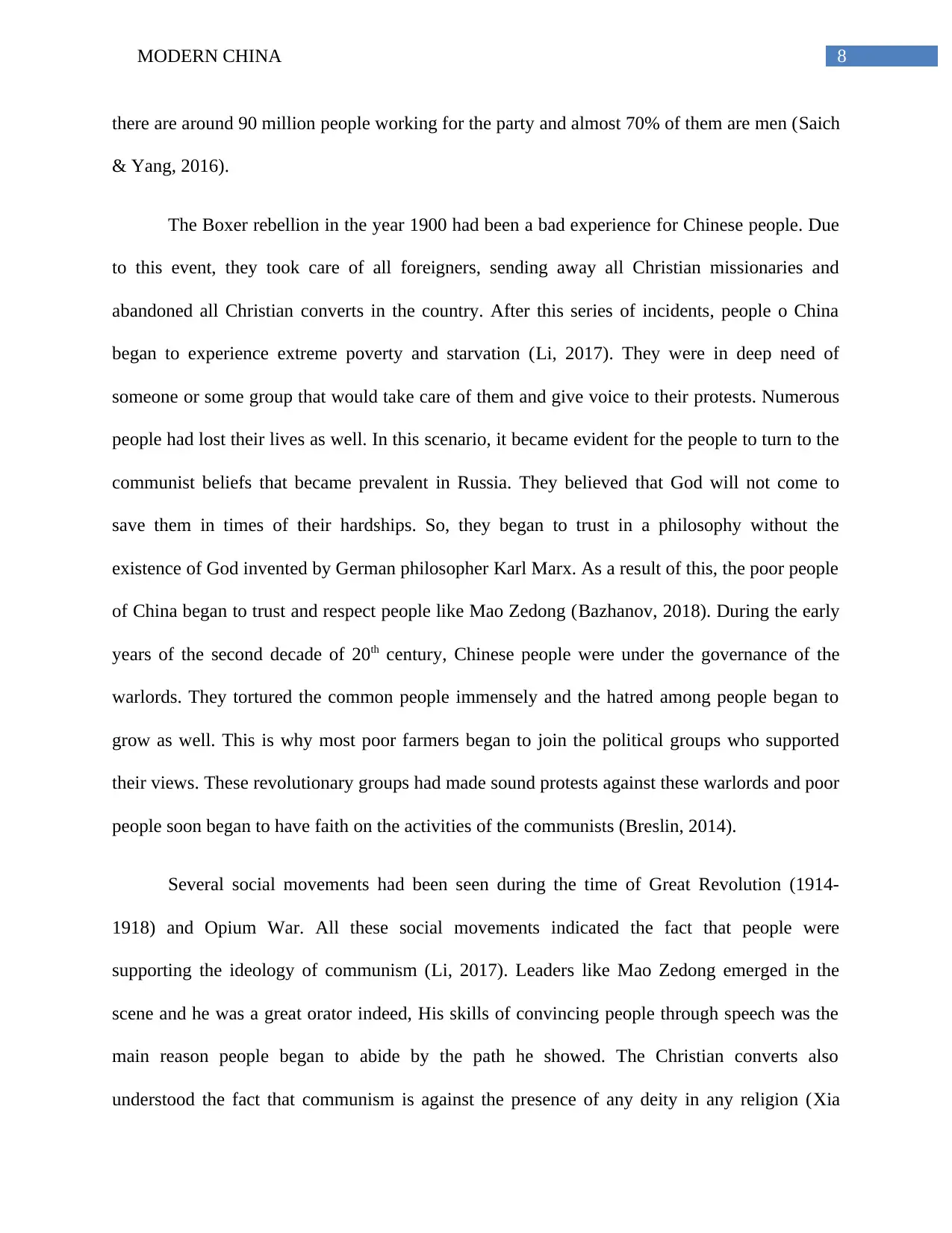
8MODERN CHINA
there are around 90 million people working for the party and almost 70% of them are men (Saich
& Yang, 2016).
The Boxer rebellion in the year 1900 had been a bad experience for Chinese people. Due
to this event, they took care of all foreigners, sending away all Christian missionaries and
abandoned all Christian converts in the country. After this series of incidents, people o China
began to experience extreme poverty and starvation (Li, 2017). They were in deep need of
someone or some group that would take care of them and give voice to their protests. Numerous
people had lost their lives as well. In this scenario, it became evident for the people to turn to the
communist beliefs that became prevalent in Russia. They believed that God will not come to
save them in times of their hardships. So, they began to trust in a philosophy without the
existence of God invented by German philosopher Karl Marx. As a result of this, the poor people
of China began to trust and respect people like Mao Zedong (Bazhanov, 2018). During the early
years of the second decade of 20th century, Chinese people were under the governance of the
warlords. They tortured the common people immensely and the hatred among people began to
grow as well. This is why most poor farmers began to join the political groups who supported
their views. These revolutionary groups had made sound protests against these warlords and poor
people soon began to have faith on the activities of the communists (Breslin, 2014).
Several social movements had been seen during the time of Great Revolution (1914-
1918) and Opium War. All these social movements indicated the fact that people were
supporting the ideology of communism (Li, 2017). Leaders like Mao Zedong emerged in the
scene and he was a great orator indeed, His skills of convincing people through speech was the
main reason people began to abide by the path he showed. The Christian converts also
understood the fact that communism is against the presence of any deity in any religion (Xia
there are around 90 million people working for the party and almost 70% of them are men (Saich
& Yang, 2016).
The Boxer rebellion in the year 1900 had been a bad experience for Chinese people. Due
to this event, they took care of all foreigners, sending away all Christian missionaries and
abandoned all Christian converts in the country. After this series of incidents, people o China
began to experience extreme poverty and starvation (Li, 2017). They were in deep need of
someone or some group that would take care of them and give voice to their protests. Numerous
people had lost their lives as well. In this scenario, it became evident for the people to turn to the
communist beliefs that became prevalent in Russia. They believed that God will not come to
save them in times of their hardships. So, they began to trust in a philosophy without the
existence of God invented by German philosopher Karl Marx. As a result of this, the poor people
of China began to trust and respect people like Mao Zedong (Bazhanov, 2018). During the early
years of the second decade of 20th century, Chinese people were under the governance of the
warlords. They tortured the common people immensely and the hatred among people began to
grow as well. This is why most poor farmers began to join the political groups who supported
their views. These revolutionary groups had made sound protests against these warlords and poor
people soon began to have faith on the activities of the communists (Breslin, 2014).
Several social movements had been seen during the time of Great Revolution (1914-
1918) and Opium War. All these social movements indicated the fact that people were
supporting the ideology of communism (Li, 2017). Leaders like Mao Zedong emerged in the
scene and he was a great orator indeed, His skills of convincing people through speech was the
main reason people began to abide by the path he showed. The Christian converts also
understood the fact that communism is against the presence of any deity in any religion (Xia
⊘ This is a preview!⊘
Do you want full access?
Subscribe today to unlock all pages.

Trusted by 1+ million students worldwide
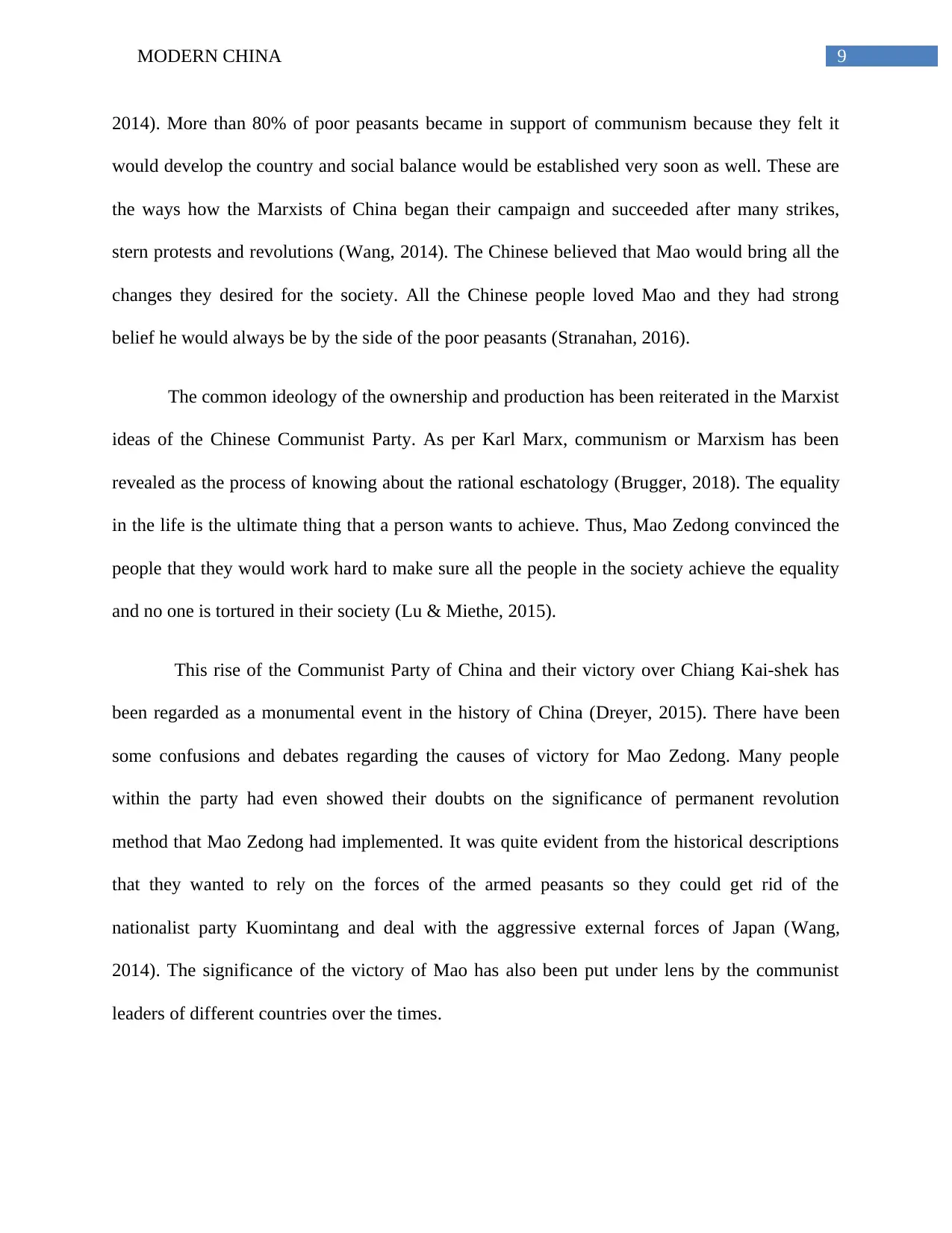
9MODERN CHINA
2014). More than 80% of poor peasants became in support of communism because they felt it
would develop the country and social balance would be established very soon as well. These are
the ways how the Marxists of China began their campaign and succeeded after many strikes,
stern protests and revolutions (Wang, 2014). The Chinese believed that Mao would bring all the
changes they desired for the society. All the Chinese people loved Mao and they had strong
belief he would always be by the side of the poor peasants (Stranahan, 2016).
The common ideology of the ownership and production has been reiterated in the Marxist
ideas of the Chinese Communist Party. As per Karl Marx, communism or Marxism has been
revealed as the process of knowing about the rational eschatology (Brugger, 2018). The equality
in the life is the ultimate thing that a person wants to achieve. Thus, Mao Zedong convinced the
people that they would work hard to make sure all the people in the society achieve the equality
and no one is tortured in their society (Lu & Miethe, 2015).
This rise of the Communist Party of China and their victory over Chiang Kai-shek has
been regarded as a monumental event in the history of China (Dreyer, 2015). There have been
some confusions and debates regarding the causes of victory for Mao Zedong. Many people
within the party had even showed their doubts on the significance of permanent revolution
method that Mao Zedong had implemented. It was quite evident from the historical descriptions
that they wanted to rely on the forces of the armed peasants so they could get rid of the
nationalist party Kuomintang and deal with the aggressive external forces of Japan (Wang,
2014). The significance of the victory of Mao has also been put under lens by the communist
leaders of different countries over the times.
2014). More than 80% of poor peasants became in support of communism because they felt it
would develop the country and social balance would be established very soon as well. These are
the ways how the Marxists of China began their campaign and succeeded after many strikes,
stern protests and revolutions (Wang, 2014). The Chinese believed that Mao would bring all the
changes they desired for the society. All the Chinese people loved Mao and they had strong
belief he would always be by the side of the poor peasants (Stranahan, 2016).
The common ideology of the ownership and production has been reiterated in the Marxist
ideas of the Chinese Communist Party. As per Karl Marx, communism or Marxism has been
revealed as the process of knowing about the rational eschatology (Brugger, 2018). The equality
in the life is the ultimate thing that a person wants to achieve. Thus, Mao Zedong convinced the
people that they would work hard to make sure all the people in the society achieve the equality
and no one is tortured in their society (Lu & Miethe, 2015).
This rise of the Communist Party of China and their victory over Chiang Kai-shek has
been regarded as a monumental event in the history of China (Dreyer, 2015). There have been
some confusions and debates regarding the causes of victory for Mao Zedong. Many people
within the party had even showed their doubts on the significance of permanent revolution
method that Mao Zedong had implemented. It was quite evident from the historical descriptions
that they wanted to rely on the forces of the armed peasants so they could get rid of the
nationalist party Kuomintang and deal with the aggressive external forces of Japan (Wang,
2014). The significance of the victory of Mao has also been put under lens by the communist
leaders of different countries over the times.
Paraphrase This Document
Need a fresh take? Get an instant paraphrase of this document with our AI Paraphraser
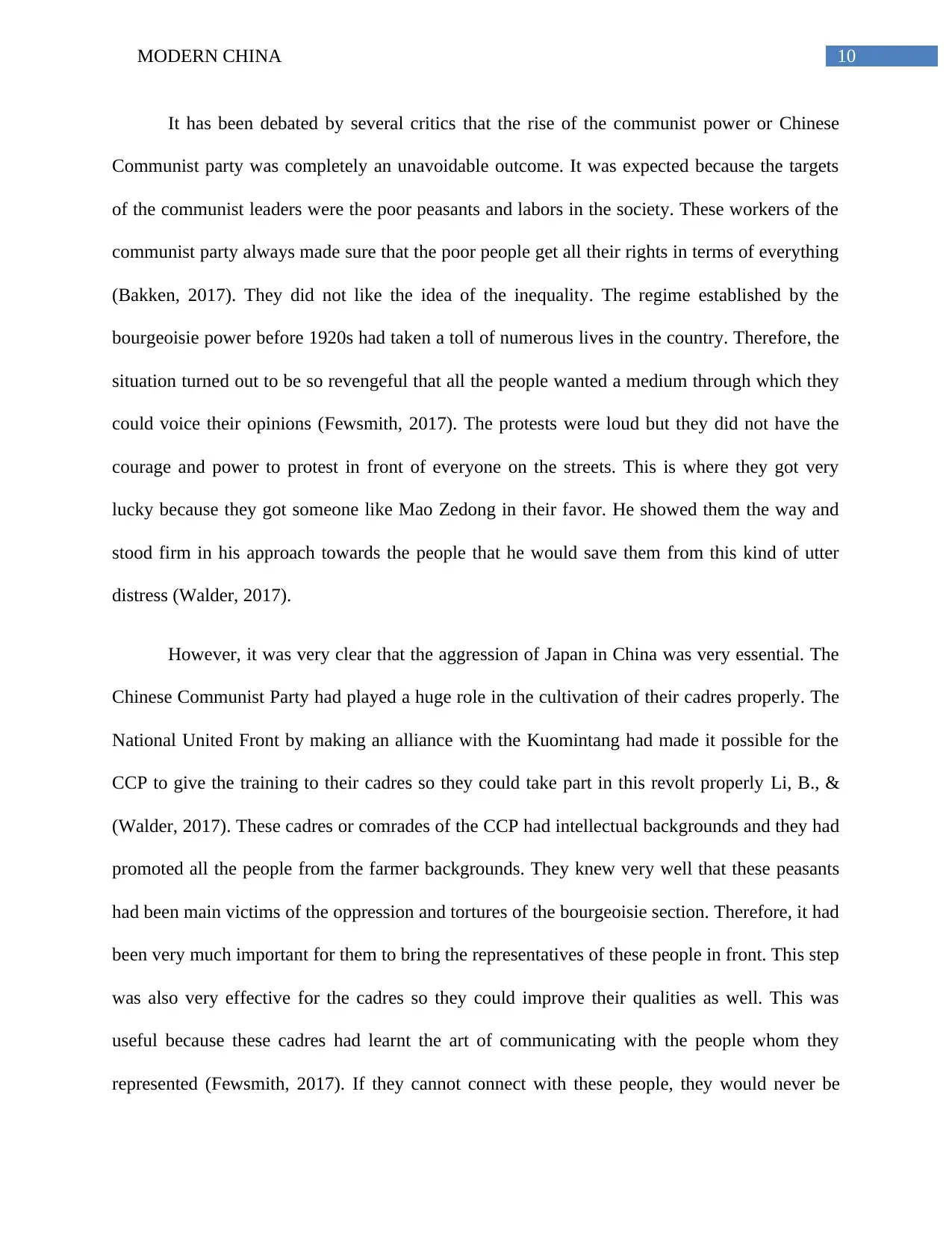
10MODERN CHINA
It has been debated by several critics that the rise of the communist power or Chinese
Communist party was completely an unavoidable outcome. It was expected because the targets
of the communist leaders were the poor peasants and labors in the society. These workers of the
communist party always made sure that the poor people get all their rights in terms of everything
(Bakken, 2017). They did not like the idea of the inequality. The regime established by the
bourgeoisie power before 1920s had taken a toll of numerous lives in the country. Therefore, the
situation turned out to be so revengeful that all the people wanted a medium through which they
could voice their opinions (Fewsmith, 2017). The protests were loud but they did not have the
courage and power to protest in front of everyone on the streets. This is where they got very
lucky because they got someone like Mao Zedong in their favor. He showed them the way and
stood firm in his approach towards the people that he would save them from this kind of utter
distress (Walder, 2017).
However, it was very clear that the aggression of Japan in China was very essential. The
Chinese Communist Party had played a huge role in the cultivation of their cadres properly. The
National United Front by making an alliance with the Kuomintang had made it possible for the
CCP to give the training to their cadres so they could take part in this revolt properly Li, B., &
(Walder, 2017). These cadres or comrades of the CCP had intellectual backgrounds and they had
promoted all the people from the farmer backgrounds. They knew very well that these peasants
had been main victims of the oppression and tortures of the bourgeoisie section. Therefore, it had
been very much important for them to bring the representatives of these people in front. This step
was also very effective for the cadres so they could improve their qualities as well. This was
useful because these cadres had learnt the art of communicating with the people whom they
represented (Fewsmith, 2017). If they cannot connect with these people, they would never be
It has been debated by several critics that the rise of the communist power or Chinese
Communist party was completely an unavoidable outcome. It was expected because the targets
of the communist leaders were the poor peasants and labors in the society. These workers of the
communist party always made sure that the poor people get all their rights in terms of everything
(Bakken, 2017). They did not like the idea of the inequality. The regime established by the
bourgeoisie power before 1920s had taken a toll of numerous lives in the country. Therefore, the
situation turned out to be so revengeful that all the people wanted a medium through which they
could voice their opinions (Fewsmith, 2017). The protests were loud but they did not have the
courage and power to protest in front of everyone on the streets. This is where they got very
lucky because they got someone like Mao Zedong in their favor. He showed them the way and
stood firm in his approach towards the people that he would save them from this kind of utter
distress (Walder, 2017).
However, it was very clear that the aggression of Japan in China was very essential. The
Chinese Communist Party had played a huge role in the cultivation of their cadres properly. The
National United Front by making an alliance with the Kuomintang had made it possible for the
CCP to give the training to their cadres so they could take part in this revolt properly Li, B., &
(Walder, 2017). These cadres or comrades of the CCP had intellectual backgrounds and they had
promoted all the people from the farmer backgrounds. They knew very well that these peasants
had been main victims of the oppression and tortures of the bourgeoisie section. Therefore, it had
been very much important for them to bring the representatives of these people in front. This step
was also very effective for the cadres so they could improve their qualities as well. This was
useful because these cadres had learnt the art of communicating with the people whom they
represented (Fewsmith, 2017). If they cannot connect with these people, they would never be
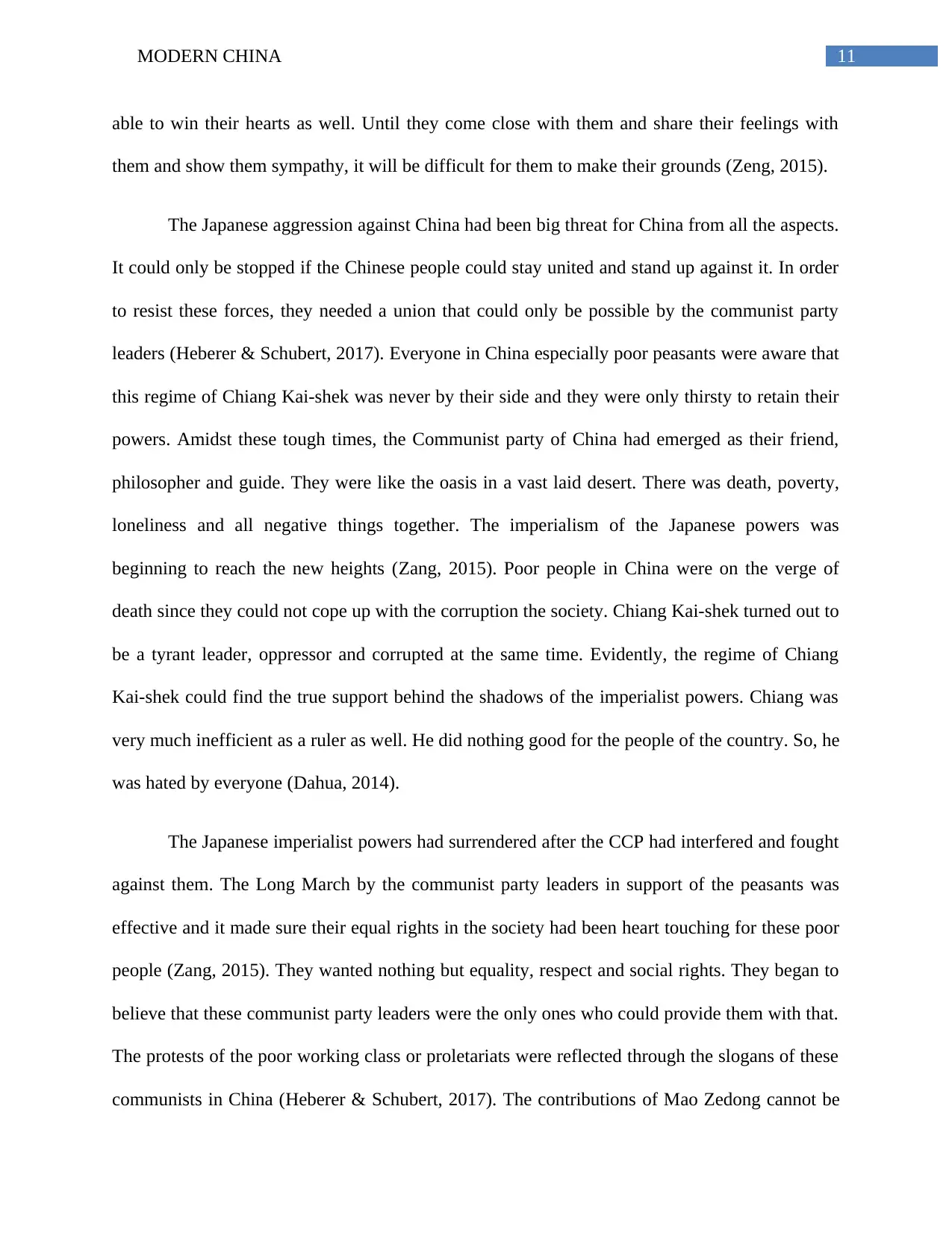
11MODERN CHINA
able to win their hearts as well. Until they come close with them and share their feelings with
them and show them sympathy, it will be difficult for them to make their grounds (Zeng, 2015).
The Japanese aggression against China had been big threat for China from all the aspects.
It could only be stopped if the Chinese people could stay united and stand up against it. In order
to resist these forces, they needed a union that could only be possible by the communist party
leaders (Heberer & Schubert, 2017). Everyone in China especially poor peasants were aware that
this regime of Chiang Kai-shek was never by their side and they were only thirsty to retain their
powers. Amidst these tough times, the Communist party of China had emerged as their friend,
philosopher and guide. They were like the oasis in a vast laid desert. There was death, poverty,
loneliness and all negative things together. The imperialism of the Japanese powers was
beginning to reach the new heights (Zang, 2015). Poor people in China were on the verge of
death since they could not cope up with the corruption the society. Chiang Kai-shek turned out to
be a tyrant leader, oppressor and corrupted at the same time. Evidently, the regime of Chiang
Kai-shek could find the true support behind the shadows of the imperialist powers. Chiang was
very much inefficient as a ruler as well. He did nothing good for the people of the country. So, he
was hated by everyone (Dahua, 2014).
The Japanese imperialist powers had surrendered after the CCP had interfered and fought
against them. The Long March by the communist party leaders in support of the peasants was
effective and it made sure their equal rights in the society had been heart touching for these poor
people (Zang, 2015). They wanted nothing but equality, respect and social rights. They began to
believe that these communist party leaders were the only ones who could provide them with that.
The protests of the poor working class or proletariats were reflected through the slogans of these
communists in China (Heberer & Schubert, 2017). The contributions of Mao Zedong cannot be
able to win their hearts as well. Until they come close with them and share their feelings with
them and show them sympathy, it will be difficult for them to make their grounds (Zeng, 2015).
The Japanese aggression against China had been big threat for China from all the aspects.
It could only be stopped if the Chinese people could stay united and stand up against it. In order
to resist these forces, they needed a union that could only be possible by the communist party
leaders (Heberer & Schubert, 2017). Everyone in China especially poor peasants were aware that
this regime of Chiang Kai-shek was never by their side and they were only thirsty to retain their
powers. Amidst these tough times, the Communist party of China had emerged as their friend,
philosopher and guide. They were like the oasis in a vast laid desert. There was death, poverty,
loneliness and all negative things together. The imperialism of the Japanese powers was
beginning to reach the new heights (Zang, 2015). Poor people in China were on the verge of
death since they could not cope up with the corruption the society. Chiang Kai-shek turned out to
be a tyrant leader, oppressor and corrupted at the same time. Evidently, the regime of Chiang
Kai-shek could find the true support behind the shadows of the imperialist powers. Chiang was
very much inefficient as a ruler as well. He did nothing good for the people of the country. So, he
was hated by everyone (Dahua, 2014).
The Japanese imperialist powers had surrendered after the CCP had interfered and fought
against them. The Long March by the communist party leaders in support of the peasants was
effective and it made sure their equal rights in the society had been heart touching for these poor
people (Zang, 2015). They wanted nothing but equality, respect and social rights. They began to
believe that these communist party leaders were the only ones who could provide them with that.
The protests of the poor working class or proletariats were reflected through the slogans of these
communists in China (Heberer & Schubert, 2017). The contributions of Mao Zedong cannot be
⊘ This is a preview!⊘
Do you want full access?
Subscribe today to unlock all pages.

Trusted by 1+ million students worldwide
1 out of 36
Your All-in-One AI-Powered Toolkit for Academic Success.
+13062052269
info@desklib.com
Available 24*7 on WhatsApp / Email
![[object Object]](/_next/static/media/star-bottom.7253800d.svg)
Unlock your academic potential
Copyright © 2020–2025 A2Z Services. All Rights Reserved. Developed and managed by ZUCOL.


